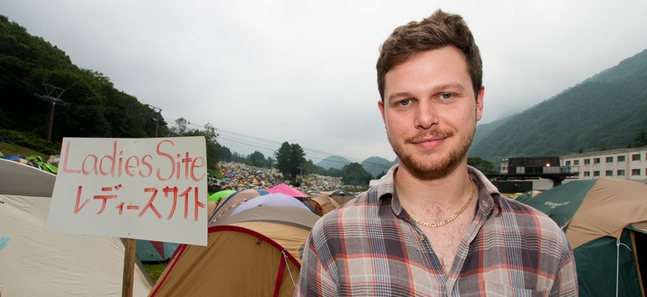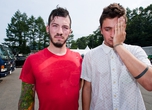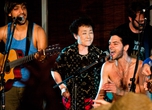Fuji Rock: Alt-J interview
‘I was amazed by how much Japan looked like Studio Ghibli’

Posted: Mon Aug 06 2012
Blending folk, pop, a cappella harmonies and detailed electronica, Alt-J are an anomaly in British indie rock, a scene that seems more content to reward bland mediocrities like The Vaccines than encourage anything remotely innovative. The Cambridge quartet's debut album, An Awesome Wave, isn't perfect, but its high points are pretty damn glorious – even if, as guitarist/vocalist Joe Newman tells us, it can be a bugger to recreate live.
Is it your first time here?
Yeah, first time. It's completely obliterated what I expected it to be like, because you go to other countries – European countries – and you kind of get a feel for the language, even though you don't speak it at all. But here it's completely different, a completely different ballgame. And the weather: it feels like the shower rooms before you go to a swimming pool, it's that kind of heat.
Is this the most alien place that you've been to so far?
I think so, yeah. I'm still pretty spaced out, but in a really good way. Have you seen any Studio Ghibli films? I was amazed by how much the landscape looked like Studio Ghibli, just the way the houses are. On the way up here, we were looking out the window and it was almost magical, just how much it looked like the animations. I was rekindling some of my childhood dreams of animals that can talk.
I've not had a chance to see you guys play live before. Just from listening to the album, then reading interviews saying you weren't relying on backing tracks…
What you see is what you get.
Right. Listening to the album, it sounds like that would be quite a challenge to recreate live.
It is a challenge. I think we're managing it quite well: a lot of people have watched us play and said it sounds just like the album. I think that's because the essential stuff that's on the album, or on particular tracks, we play – and we fill it the best we can with the hands that we have on stage. We were always keen to make the best album, and not be limited by what we could only do live. We didn't want to think, 'Let's not do this particular bit, because how are we gonna do it live?' We wanted to get it, and then figure out how we do it live as we go along.
So were there any songs that you had to reconfigure quite a lot in order to play them live?
No, not reconfigure. There's things that we've had to do that we wouldn't do had we not recorded it the way we did when we were doing the album. There's a track called 'Something Good', and there's some really clever production going on that we've had to recreate physically with our voices. It required some getting together and working out exactly how we can translate that particular kind of clever bit on the album to the live stage, where it was just [keyboardist] Gus singing a note, and [bassist] Gwil going, like, 'Chk', and me doing a note over both of them.
Do you feel you're getting better the more shows you play?
Yeah, you're getting better and you're getting more confident. You get less nervous – which isn't necessarily a good thing – because you become more used to the routine of doing festivals and doing gigs. And we are improving as a band, playing live. That was something that we really struggled with to begin with, because although we were around for a long time – just on our own, doing our own thing in our own little world – we hadn't actually been playing that many gigs. So when we started getting attention, we really had to up our game. We were aware that our live performance wasn't there – we weren't comfortable on stage, we hadn't found our feet – so this last year and a half has really been a journey for us, in terms of getting comfortable on stage. We're still getting there, but we're feeling a lot more confident, we sound a lot tighter, and we enjoy playing on stage now – it's becoming more carefree than it was before.
Some of the comments on your earlier YouTube videos are really picky: 'awkward key change', for example. I guess that gets a lot smoother the more that you do it.
Exactly. I think a fan should always have a certain amount of patience for a band, because they're never going to be perfect, and they always need time to develop.
It must be quite difficult, given that your recordings came out sounding fully formed…
Yeah, that's the thing. As a band, we started as a recording band: we weren't interested in playing live. I first started with Gwil, the bassist, and he had GarageBand, and we were only really keen on recording a song and putting it on MySpace. We were like: that's it, it's done. And as we've kind of got a taste for it, we started listening to other bands, and we were like, 'Well, maybe we should start playing live.' For me, still, I've always enjoyed the recorded track more than I enjoy watching it live, because for me it's always perfect – there's no kind of change. A lot of people feel the opposite, but for me, I like that it's always there, it's always the same, and you can always rely on it. It's bizarre. But I love playing live, and as we develop I suppose we're going to do more interesting things live.
You're playing an early afternoon set here, which I guess generally isn't the ideal setting for any band. What would be the perfect setting for one of your gigs, if nothing was limiting your options?
I prefer playing in really close quarters to the audience, so something that's got great acoustics – a cave would be really interesting, lit up with candles. And also, putting on something which wasn't just us, but was other things as well: it wouldn't be a festival or anything like that, but it would be an evening with some really nice, interesting music – I would say harmony-based. There's a band called Mountain Man, which is an American band, a three-girl harmony group. They're fantastic – I can imagine them just being amazing in that cave. And because Gus and I do a lot of harmonies. I would say a cave with loads of candles, and a crowd of about 60…
You're being quite precise here.
And it's raining outside as well. There you go.
With the harmonies, did those come naturally, or was it something that you had to spend a while working with?
Gus was a chorister, and he sang from a very early age. He's very well read in terms of music theory – he's Grade 8 on the piano, Grade 5 on the oboe, he's graded in singing, I think 5 – so he's naturally had a very rich classical upbringing. And I listen to music that my dad used to listen to, which is kind of folk, Americana – Crosby, Stills & Nash, James Taylor, Simon & Garfunkel, things like that. Gus and I were friends before we were musicians, and we became really close friends, so I think when we first started singing, we immediately hit it off musically. I would normally come up to him with a melody, and then he would just immediately, straight off the bat, come up with something. And nine times out of ten, we normally go with his first rendition of his part alongside mine. We're quite naturally on the same kind of wavelength, but definitely being together for a long period of time has helped that, so we're more fluent at nailing it quicker.
Do you think the first vocal that comes to mind is generally the best?
I do, actually. That's why I often record everything I sing. Something like 'Fitzpleasure' – I was looking at the first time I came up with that riff. I recorded it, and I was singing along to it. Basically, I copy and paste, so I picked something from there that I did for the first time; I was like, 'That sounds really good, I'm going to put it in the song.' Often I'm improvising, and taking it and putting it in the original song. A lot of it is improvised, in the sense that that's the first thing that came out of my mouth when I played that tune.
It sounds like the way some pop production factories work…
Often with songs, that's how it works with us as well. As long as you know the structure of the song, and you've got an idea of the narrative. I just basically look through about eight recordings I've done on my own – vocal recordings – and I choose the bits I like and then splice them together.
Is it always the melody that comes first and then the lyrics afterwards?
It actually depends. Every song has a different beginning. It's like a creative explosion: an idea or phrase I've read in an article can trigger [the thought], 'Wow, that's an amazing thing.' We've got a song called '(Interlude 1)', which is just before 'Tessellate' on the album. There's a phrase in it, 'the ripe and ruin', and that was something that I read in an article that was talking about a picnic, and how there was 'a fine line between the ripe and the ruin of fruit'. I was just like, 'ripe and ruin' is such a powerful thing – it triggered this whole massive explosion of ideas. Other things like 'Tessellate': the chords and the rhythm, the pattern that I do on the guitar – in terms of plucking – were the beginning of that song. They all have different beginnings.
Alt-J's 'An Awesome Wave' is out now on Hostess
Tweets
- About Us |
- Work for Time Out |
- Send us info |
- Advertising |
- Mobile edition |
- Terms & Conditions |
- Privacy policy |
- Contact Us
Copyright © 2014 Time Out Tokyo














2 comments Add a comment
So you're a Vaccines fan, then?
Every Time Out Tokyo music article is written by some pedantic, pretentious piss ant who seems only interested in attempting to take witty pot shots. Your music writing staff are a joke. Well done on your zero Facebook like's and your three re-tweets, I'm sure you and your mum look back on them with pride.
Add your comment